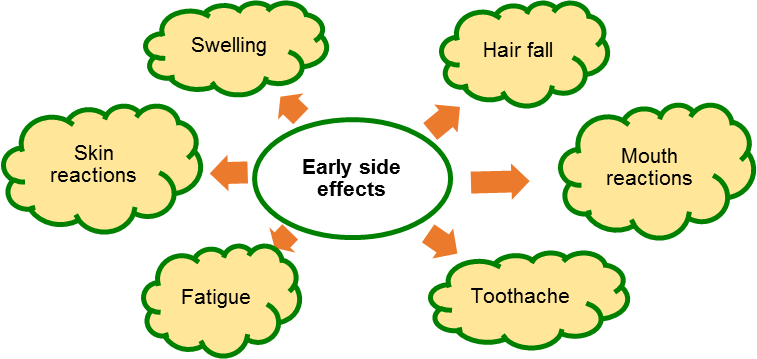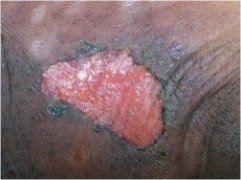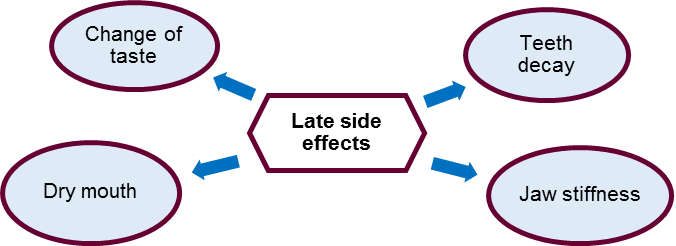
Radiotherapy for the head and neck region usually includes the facial and neck area. Sometimes only a part of the face and neck (left or right) requires radiation treatment. The normal tissues in this area are the skin, hair roots, inner lining of mouth, gum and throat, tongue and taste buds, salivary glands and teeth.
What Are The Early Side Effects?
Early side effects are the changes or reactions of normal tissues that happen during radiation treatment. Some early effects of head and neck radiotherapy that may occur are displayed in the graphic. Most of the early reactions may appear after 2 to 3 weeks of radiation treatment.

Fatigue
This is a general side effect of radiation treatment. For detailed explanation and care, please refer to Radiotherapy Side Effects / Non-Specific and Specific Effects / Fatigue.
Skin Reactions And Swelling

The skin reaction on the face is moderate (red and dry) but it can be quite bad on the neck as the skin is thinner. At the base of neck, the skin may breakdown because of skin surface rubbing against each other (skinfolds). Wear loose T-shirt with wide collar so that reactions will not become worse. For detailed explanations on skin reactions and care, please refer to Radiotherapy: Skin Reactions And Care. Soft tissues on the face and under the chin may become slightly swollen (lymphedema) after receiving radiation. Facial exercises can promote fluid circulation and reduce swelling.
Hair Fall
Due to radiation effects on hair roots, hair loss may occur at the back of the neck and behind the ear. Facial hair may stop growing temporary. If shaving is necessary, use electric shaver instead of razor blade to prevent skin cuts or injuries.
Mouth Reactions
The inner surface of mouth, gum and throat is sensitive to radiation. Some of these changes that may take place inside the mouth and the resulting effects are listed in the graphic. The reactions are more serious if the total radiation dose to the lining is higher, the general health condition of the individual is poor and the person receiving treatment smokes tobacco or drink alcohol.
|
Normal tissues |
Reactions |
Effects |
|
Inner lining of mouth, gum and throat |
|
Pain, sore throat, difficult to eat & swallow |
| Tongue / taste buds |
|
Difficult to eat, no appetite |
| Salivary glands |
|
Dry mouth, difficult to swallow, toothache & risk of infections |
It is very important to take care of the mouth and teeth cleanliness so that mouth reactions can be reduced or prevented from becoming worse. Medications may be given for infections and to relieve pain. For individual using denture, inform the dental doctor when the denture become too loose or tight as it can injure the lining of the gum or tongue.
How To Take Care Of The Mouth And Teeth?
|
|
|
Mouth reactions can make eating and swallowing solid food difficult. If the person does not eat well and does not have enough nutrients, he or she may lose weight. Please refer to Chest Radiotherapy: Side Effects And Care/ How to reduce effects and improve food intake?
Are There Any Late Side Effects?
Late side effects are reactions that occur months or years after treatment has completed. Some late effects of head and neck radiotherapy that may occur are shown in the graphic.

Long term dry mouth may occur due to damaged salivary glands producing less or no saliva after radiation treatment. Symptoms may be improved with reduce caffeine intake, avoid alcohol and smoking, sip water often to wet mouth, suck on lemon drops to stimulate saliva production and use saliva substitute to make swallowing easier.
To counter change or loss of taste, use seasoning and herbs to add flavour to food, try new flavour or ingredients to induce appetite.
Jaw stiffness may occur due to weakened facial muscles, making joint movement difficult. This may affect mouth cleanliness and care. Exercise the muscle by doing simple jaw movement such as opening and closing the mouth, chewing on non-sugary gum to prevent joint stiffness.
Every person who will receive head and neck radiotherapy, must go to a dental doctor for oral and teeth care before any treatment planning and treatment procedure is carried out. After radiation therapy has completed, the person must continue regular follow up with the dentist to monitor oral and teeth health.
Radiotherapy is designed specially for each individual, taking into consideration the radiation effects on normal tissue in the treatment area. However, every person is unique and may react differently to the radiation treatment.
Find out information about the specific side effects that may occur with your treatment from the radiation oncologist and radiation therapist before treatment begin. Always let them know what you are experiencing and how you feel so that they can help you to minimize the symptoms, to reduce anxiety and to cope better.
References
- http://www.cancer.org/treatment/treatmentsandsideeffects/treatmenttypes/radiation/understandingradiationtherapyaguideforpatientsandfamilies/understanding-radiation-therapy-radiation-to-certain-body-parts
- www.cancer.gov
- Picture from slide presentation of Aishah S A. Radiotherapy side effects and Patient care
- Graphic from Ms Aisyah bt Zulkifli
| Last Review | : | 26 May 2017 |
| Writer | : | Sarah Lee Abdullah |
| Accreditor | : | Dr. Ros Suzana binti Ahmad Bustamam |







